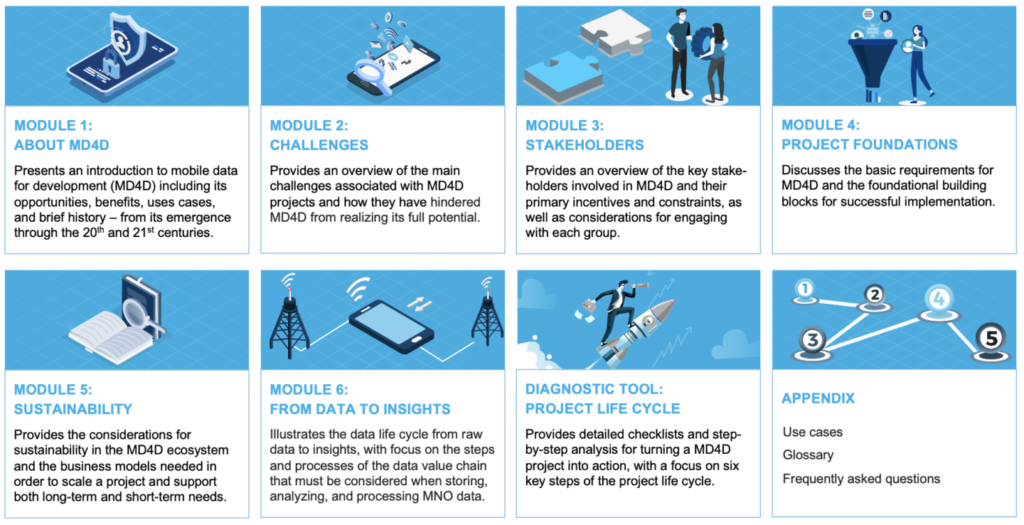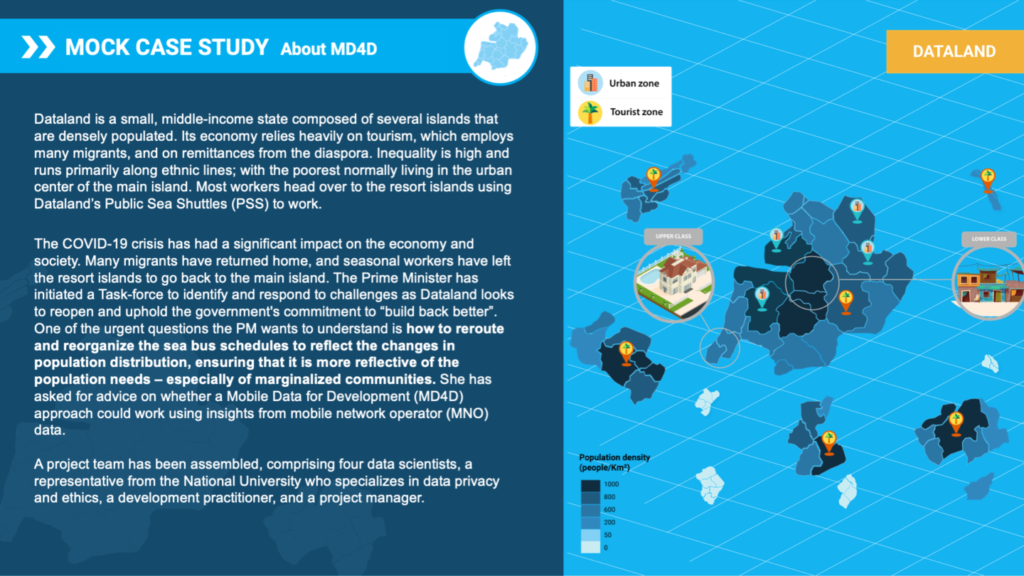DISCUSSION PIECE

Piece originally published on DIAL’s website.
Last week, the Digital Impact Alliance (DIAL) and Data Pop Alliance made public a free online handbook on Mobile Data for Development (MD4D), available here on the DIAL Online Catalog, as a result of a 10-month collaboration between both organizations. (Note: You can navigate the handbook through your web browser, as well as access a PDF download through the navigation sidebar on the left.)
This Handbook has been a long time coming, but COVID-19 provided added momentum. Soon after the pandemic started, we realized that many gaps remained that impeded mobile data from being used to assist response efforts; some 5 years after it proved impossible to access these data during the Ebola epidemic, it appeared that we were yet again “missing an opportunity”. The main reason is simply that accessing and using MNO data (as other privately-held data) brings about complex challenges and requirements — legal, technical, political, ethical, institutional, financial, and cultural.
These challenges are now reasonably well understood thanks to many pilots and proofs-of-concept developed over the past decade, which have also helped yield lessons and best practices on how to address some of them. Yet, this knowledge created by organizations including DIAL, Data-Pop Alliance, Flowminder, Cooper/Smith, Dalberg Data Insights, UN Global Pulse, Positium, and more, had never been compiled and presented in a way that would ensure its wide diffusion and use.
The MD4D Handbook was designed to fill that gap. Its main objective is to provide a free, easy-to-use, very concrete, practical and actionable resource to help anyone interested in developing an MD4D project navigate the various facets and steps involved, based on experiences garnered over a decade. While its primary audience are managers, practitioners and researchers in MNOs, National Statistical Offices, line ministries, Civil Society Organizations, and academia who may be directly involved in setting up and implementing such projects, it should also be of interest to senior decision-makers who may have to be persuaded of the value and feasibility of embarking on such project, and the general public.
Some of the main requirements we see to help MD4D realize its potential include:
- Meeting and Engaging with Real-World Demand: One of the primary ways to ensure that insights from a MD4D project lead to tangible impact is to stress-check that the project is demand-driven and addresses a clear need. Working with stakeholders (and particularly intended users) from the beginning to clearly define the problem statement and objectives of a MD4D project is paramount for ensuring real-world adoption – and this step is often missed when a project is conceived.
- Identifying Champions and Decision-Makers: MD4D can provide critical additional information from non-traditional sources, rounding out information from more traditional datasets. Yet these new insights do not always reach the right decision makers. It is also important to identify champions within the government and NGO community who can advocate internally for the use of MD4D.
- Institutional Flexibility: MD4D projects are often challenged by institutional rigidity. For example, we now know that humanitarian agencies and NGOs have been challenged to build their institutional capacity to be able to leverage insights from technology pilots. The adoption, integration, and scaling of mobile technology and data applications usually requires organizational change and adaptation to drive projects towards real-world action.
- Monitoring, Evaluation, and Learning: MD4D projects have struggled to conduct impact analyses and use data to adapt in real-time once a project is deployed. It is crucial to build a solid framework for measuring, evaluating, and demonstrating the results and impact of MD4D projects. Developing a robust MEL framework from the outset will help crystalize the objectives of a MD4D project, as well as a means of documenting lessons learned and driving wider adoption and advocacy.
In addressing these gaps, the handbook is organized into modules that each cover specific topics with key tips and resources. Critically, the Handbook is anchored in the “Principles for Digital Development” developed by DIAL and endorsed by dozens of organizations, which it aims to reflect and foster with corresponding legends throughout. The Handbook also includes a “feasibility tool” to help users take advantage of the insights offered in the playbook and make the decisions that are right for their project, given their unique needs and context-specific requirements.
Finally, the handbook includes illustrative case studies of MD4D projects in the real world, as well as a Mock Case Study taking place in a fictional island country, “Dataland”. In the case study, Dataland is facing the challenge of reorganizing its sea bus routes after COVID-19 dramatically changed its population distribution. We hope this case study will help guide readers and users through the project life cycle.
Over the coming months, DIAL and Data Pop Alliance will be working together to disseminate this Handbook within the digital development community and put it in the hands of those who need it. We have already done an introductory session at the World Summit on the Information Society (WSIS) and will be providing a more detailed overview during our upcoming session at the Global Digital Development Forum (GDDF).
In the meantime, if you have any questions on the playbook, feedback to share, or would like to get in touch, please email us at contact@datapopalliance.org or MD4Dhandbook@digitalimpactallinace.org. We look forward to hearing from you!



![M002 - Feature Blog Post [WEB]](https://datapopalliance.org/wp-content/uploads/2025/10/M002-Feature-Blog-Post-WEB.png)





